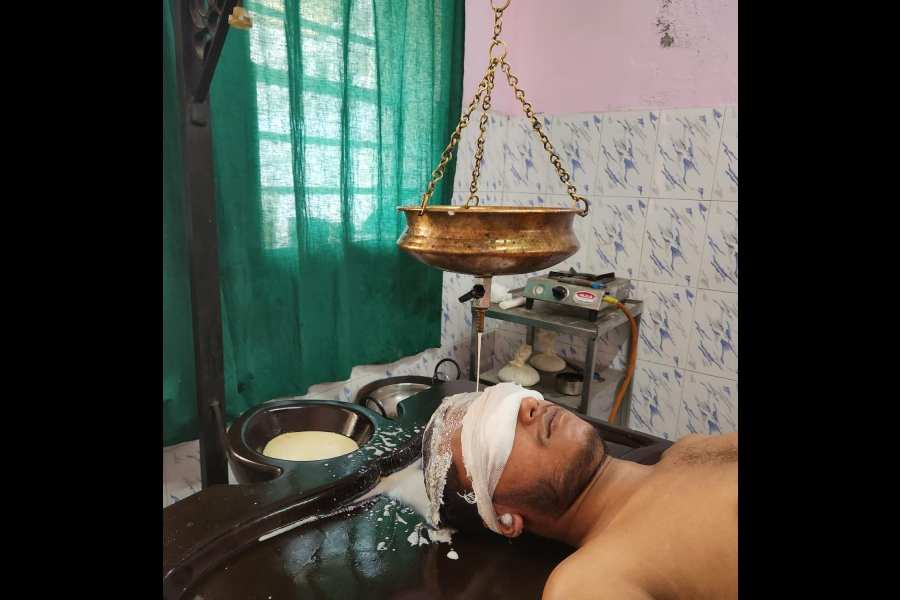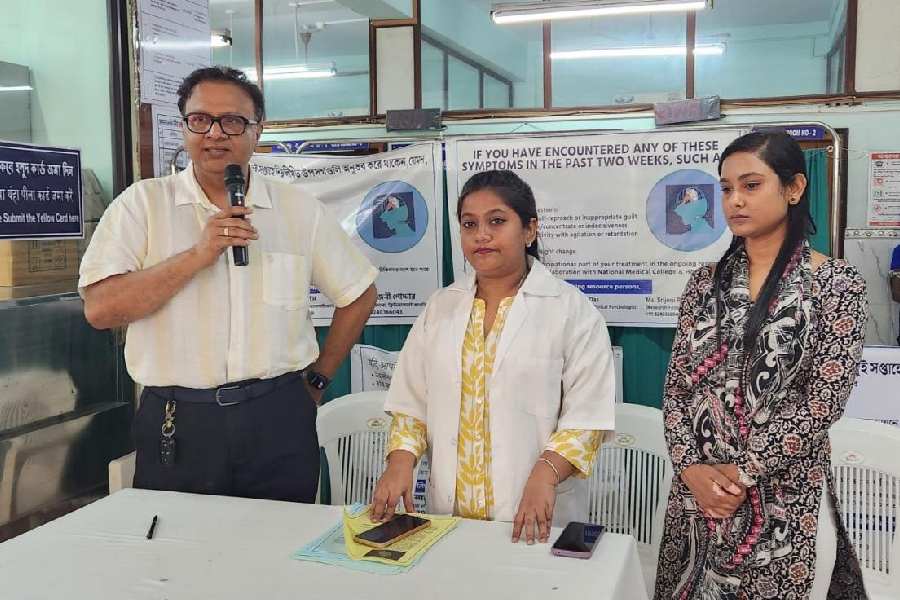A new joint initiative by three medical institutes promises holistic treatment for those suffering from depression, free of cost. Instead of relying solely on strong allopathic medicines, the treatment will use a blend of yoga, meditation, counselling and external ayurvedic treatments and massages with minimal use of pharmaceuticals.
“Most bodily ailments are manifestations of mental conditions,” said Dr G. Babu, director of the Central Ayurveda Research Institute (CARI) in Sector V. This centre, under the ministry of Ayush, conducts research, has an OPD (out-patient department) that serves 150–200 patients daily and also has a 20-bed provision for in-patient care. The centre is in the lane behind Wipro.
“Allopathic medicines can have side effects on the liver, kidneys and other organs so this research will be to determine the minimum effective dosage of medicine while relying on alternative therapies,” Dr Babu added.

A patient receives shirodhara treatment
The study is being conducted jointly by CARI, the psychiatry department of Calcutta National Medical College and Hospital (CNMC), and the Institute of Psychiatry under the Institute of Post Graduate Medical Education & Research (IPGMER).
“The project will span two years, with up to 80 patients enrolled for six months of treatment each. Ten slots have already been filled, but we welcome more. All consultations, tests and medicines will be free. We will also provide Rs 7,100 for the patient’s conveyance to and from the hospital and a Rs 5 lakh medical insurance policy in case of any complications during treatment,” said DrDipsundar Sahu, principal investigator of the project.
Open to all
Any depressed person aged between 18 and 60 is eligible. “The term ‘depressed’ is often used casually these days,” said clinical psychologist Srijoni Poddar. “Feeling low after an argument but then heading to a party is not clinical depression.”
Depression, she explained, is a sustained state of low mood lasting at least two weeks. One may experience symptoms such as not wanting to get out of bed, attending work but being unable to perform, lack of energy, poor concentration, indecisiveness, sleep disturbances, crying spells, difficulty motivating oneself, appetite changes with weight fluctuations, and loss of interest or joy in daily life.
Patients will be evaluated using the Hamilton Rating Scale for Depression to confirm diagnosis and assess severity. “We will include only mild to moderate cases. Those with severe depression are expected to already be dependent on medication, and we cannot ask them to stop abruptly for the sake of our study,” Sahu clarified.
“The patients’ progress will be recorded before, during, and after treatment using the Global Functional Rating Scale to assess the therapy’s effectiveness,” added clinical psychologist Mandira Das.
Breathe & bathe easy
The ayurvedic treatment for patients will include shirodhara, in which a stream of medicated liquid is gently and continuously poured over a specific point on the forehead. This 40-minute treatment uses a blend of ksherbala oil and milk. Another therapy, abhyanga, is an ayurvedic massage using specialised oils to calm the nervous system.
Yoga expert Jagriti Patra said specific asanas and pranayamas will be incorporated into the treatment at different stages. “Asanas such as Paschimottanasana (seated forward bend) and Ustrasana (camel pose), along with pranayamas like suryavedi and kapalbhati, help improve concentration and support the nervous system,” she said.
The treatment from IPGMER will be led by clinical psychologist Dr Prasanta Kumar Roy and from CNMC by psychiatrist Manabendra Makhal.
“Through this project, we also want to eliminate the stigma around mental health,” said Sahu. “Currently, about 20 per cent of our patients come in with psychological issues like depression, anxiety and related disorders but more need to feel free to seek treatment.”










